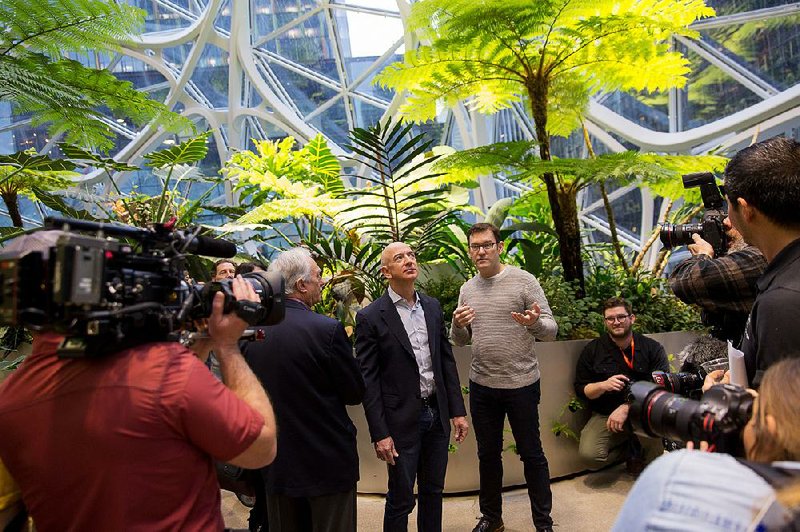SEATTLE -- Surrounded by jungle plants under a glass-domed ceiling four stories high, Washington and Seattle political leaders got up on a rainy January day to toast Amazon's success and their hopes for a long-lasting partnership.
The occasion was the opening of the Amazon Spheres, the centerpiece of a $4 billion corporate campus now home to more than 45,000 workers. The spheres, declared King County Executive Dow Constantine, were "a permanent expression of this company's commitment to Seattle."
But behind the bonhomie was a simmering tension between Seattle's largest employer and city officials bent on raising more money to combat homelessness.
Just 93 days later, Amazon delivered a reminder that many of its commitments are not set in stone.
The tension reached full boil last week as Amazon halted planning for one skyscraper and said it would consider subleasing another, pending the outcome of a City Council vote on a tax that would charge large businesses to fund homelessness services and low-cost housing.
The move, Amazon's biggest show of muscle in Seattle civic life, left many with the impression that the company, after adding 40,000 workers to its ranks in the city over the past eight years, might fully halt its growth here -- or even reverse course -- if the tax goes through.
In addition to the direct challenge to Seattle's City Hall, observers say, the unusual public spat sends a message to the 20 regions vying to host Amazon's second headquarters: Executives at the company, who wove a preference for low taxes into their business, won't hesitate to curb investment if a local government tries to change the rules. Even in its hometown, Amazon is comfortable playing hardball.
The current flash point is Seattle's head tax, a proposed levy on companies with more than $20 million in revenue. It drew support from a majority of the City Council, and was scheduled for a full council vote later this month.
Amazon, which had made its opposition to the proposal known to city officials through its policy staff and trade groups, this last week upped the ante. The company halted planning on a 17-story tower on land it owns in its core corporate campus, and floated the idea of subleasing Rainier Square, a downtown skyscraper under construction that the company had previously leased.
Together, the buildings were scheduled to hold about 7,000 employees.
"They clearly want to send a message to City Hall, that we can't take for granted that the growth we're experiencing is going to go on endlessly," said Peter Steinbrueck, a commissioner with the Port of Seattle and former City Council member.
The company declined to comment beyond its earlier statement confirming it had suspended some work pending the vote.
Amazon, which moved to Seattle in 1995, a year after its founding, became one of the most disruptive forces in business by figuring out how to deliver goods and services more efficiently than anyone else. In the past decade, it came to dominate categories of online retail, and pioneered new businesses in electronics and cloud-computing technology.
At the same time, Amazon has emerged as a disruptive force within its hometown, showering Seattle with about $31 billion spent on its campus and employee salaries over the past eight years. Yet it also has become a byword for a transportation crunch and the skyrocketing cost of living that has deepened the city's homelessness crisis.
When Amazon announced in September that it was seeking to build a second, "equal" headquarters, roughly the same size as its Seattle base, business and political leaders fretted that a fissure had formed between the city and company. Others were relieved, hoping for a pause in the economic dislocation that has accompanied the boom.
Outside of Seattle, mayors pounced: 238 regions submitted proposals to host Amazon's second headquarters. Many complied with Amazon's request for tax breaks and other incentives, with several cities offering multibillion-dollar packages.
Amazon has repeatedly used the threat of job losses, and the promise of investment, as bargaining chips with state and city governments.
In one episode, Amazon laid off its workers at a warehouse in Texas in 2011 rather than comply with a state determination that it owed $269 million in back sales taxes.
As the company agreed to start collecting sales tax in the following years, it negotiated deals with state governments, sometimes promising jobs and investment in exchange for a tax holiday.
"It's a core part of their strategy," said Stacy Mitchell, co-director of the Institute for Local Self Reliance, an advocacy group that has been critical of Amazon. "Asking states and cities for handouts and a competitive advantage."
The precise impact of Seattle's proposed head tax is unclear.
The levy's first phase would assess about $500 per full-time employee, per year, a sum that places Amazon's liability at its current head count at $20 million to $25 million. That changes in 2021, when the tax would convert to a 0.7 percent payroll tax.
By then, the company's expansion plans -- now on hold -- would have given Amazon space for at least 55,000 employees, placing the company's liability at an estimated $43 million, based on an analysis of salary data posted to job site Glassdoor. (That tax burden would rise further if the tax was also applied to employee stock grants.)
During the most recent 12 months, Amazon reported $3.9 billion in net income, and paid $1.2 billion in income tax to governments worldwide. An additional $43 million would equal about a 3.6 percent tax increase.
The overall business-tax burden in Seattle ranks about middle-of-the-pack nationally, according to an analysis by the Anderson Economic Group, which calculated rates based on all state and local taxes paid by businesses as a share of their profits.
But of the 19 U.S. cities and regions selected as finalists for Amazon's so-called HQ2, 14 are in states estimated to have a lower burden than Washington state, according to the Chicago-based consultancy.
Business on 05/08/2018
